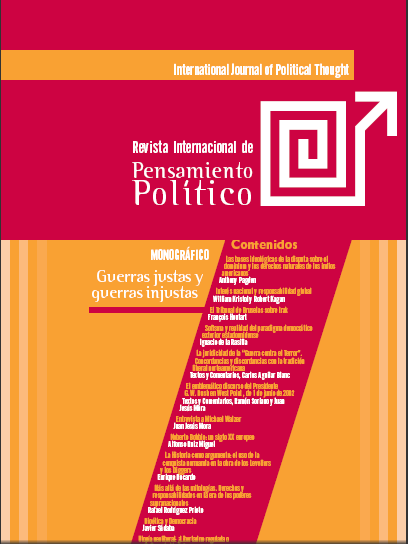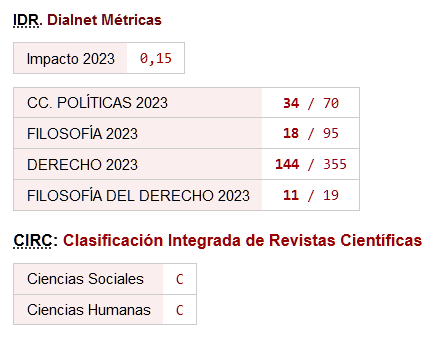Ideological Foundations of the dispute on the dominium and American indigenes’ natural rights
DOI:
https://doi.org/10.46661/revintpensampolit.1481Keywords:
natural law, civilization, trade, Fair warAbstract
The essay examines the history of the debates over the natural rights, what, in the language of neo-Thomism was called dominium, of the American Indians prior to the arrival of the Spanish. The author argues that for the Dominican Francisco de Vitoria and his heirs there was no reason to believe that, under natural law, the Indians were not in full and legitimate possession of the lands they occupied before the arrival of the Europeans, and that the conquest of the Americans were therefore illicit. He examines how this debate was conducted from the sixteenth until the eighteenth century and how, in the end, the only secure grounds which could be claimed were not ones of possession or of sovereignty but instead what Vitoria had called the right of “Natural society and communication”. This implied that territorial occupation of one nation by another was indeed illicit and that the only legitimate interaction between peoples had to free exchange. By making these claims the Spanish theologians of the sixteenth-century had, in fact made possible the later arguments for a necessary transition from territorial imperium to a global community based on trade.
Downloads
References
Bataillon, Marcel (1965): “Vasco de Quiroga et Bartolomé de las Casas”, en Études sur Bartolomé de as Casas, Paris.
Boswell, James (1934): Boswell’s life of Johnson, edi. por G. B. Hill, 2 vols., Oxford.
Brufau Prats, F. J. (1960): “El pensamiento político de Domingo de Soto”, en Acta salamanticensis, no. 4, pp. 280-284.
Cano, Melchor (1546): “De dominio indorum”, Biblioteca Vaticana MS. Lat. 4648 Dealy, R. (1976): The politics of an Erasmian lawyer: Vasco de Quiroga, Malibú.
De Pradt, Dominique Dufour (1817): Des colonies et de la révolution actualle de l’Amerique 2 vols., Paris.
Genovesi, Antonio (1835): Della diceosina o sia della filosofia del giusto e dell’onesto, Milán.
Giménez Fernández, Manuel (1944): “Nuevas consideraciones sobre la historia y el sentido de las letras alejandrinas de 1493 referentes a las Indias”. Anuario de estudios americanos. vol. I, pp. 173-429.
Grotius, Hugo (1916): The Freedom of the Seas [De Mare Libero]. Traducido al inglés por Ralph van Deman Magnoffin, Nueva York, Oxford University Press.
Hont e Ignatieff, (1983): “Needs and justice in the Wealth of Nations”, en ealth and virtue. The shapping of political economy in the Scottish Enlightenment, edits. por Istvan Hont y Michaeld gantieff, Cambridge, pp. 1-44. DOI: https://doi.org/10.1017/CBO9780511625077.002
Las Casas, fray Bartolomé de (1951): Historia de las Indias (1527), edi. de Agustín Millares Carlo, 3 vols., México.
Nuix, Juan (1782): Reflexiones imparciales sobre la humanidad de los españoles en las Indias, contra los pretendidos filósofos y políticos, para ilustrar las historias de MM. Raynal y Robertson, Madrid.
Pagden, Anthony (1986): he fall of natural man. The American Indian and the origins of comparative ethnology, 2ª edición, Cambridge.
Pagden, Anthony ((1987): The languages of political theory in early-modern Europe (edit.), Cambridge. DOI: https://doi.org/10.1017/CBO9780511521447
Parel, Anthony (1979): “Aquinas’s theory of property” en Theories of property: Aristotle to the present edts. de A. Parel y T. Flanagan, Calgary, pp. 89-111.
Pereña, L. (1982): De bello contra insulanos, edi. a cargo de Luciano Pereña et alia, Madrid Quiroga, Vasco de (1974): nformación en derecho, edit. por Paulino Castañeda Delgado, Madrid.
Raynal, Guillaume Thomas (1780): Historie philosophique et politique des établissemes et du commerce des Européens dans les deux Indies, 4 vols, Génova.
Rossi, Paolo (1972): “La propietá nel sistema privatistico della seconda scolastica”, en La seconda scolastica nella formazione del diritto privato, edi. por Paolo Rossi, Milán, pp. 117-222.
Sepúlveda, Juan Ginés de (1780): Joannis Genesii Sepulvedae cordubensis opera, 4 vols., Madrid.
Sepúlveda, Juan Ginés de (1951): Demócrates segundo, o de las justas causas de la guerra contra los indios, en Angel Losada (ed.), Madrid.
Skinner, Quentin (1978): The foundations of modern political thought, 2 vols., Cambridge. DOI: https://doi.org/10.1017/CBO9780511817892
Solórzano y Pereyra, Juan de (1972): Política indiana sacada en lengua castellana de los dos tomos del derecho i gobierno municipal de las Indias, en la Biblioteca de autores españoles, Madrid, vol. CCLII.
Soto, Domingo de (1556): De iustitia et iure, Salamanca.
Suárez, Francisco de (1613): Defensio fidei catholicae et apostolicae adversus anglicanae sectae, Coimbra.
Tuck, Richard (1979): Natural rights theories: their origin and development, Cambridge. Tully, James (1980): A discourse on property. John Locke and his adversaries, Cambridge.
Vitoria, Francisco de (1932-52): Comentarios de la Secunda Secundae de Santo Tomás (1534-7), edi. a cargo de V. Beltrán de Heredia, 6 vols., Salamanca.
Vitoria, Francisco de (1960): Obras de Francisco de Vitoria, edi. de Teófilo Urdanoz, Madrid.
Vitoria, Francisco de (1981): Relectio de iure belli edi. de L. Pereña et alia, Madrid.
Vitoria, Francisco de (1991): Political Writings, editado por Jeremy Lawrence y Anthony Pagden, Cambridge University Press. DOI: https://doi.org/10.1017/CBO9780511840944
Wattell, Emerich de (1820): Le droit de gens ou principe de la loi naturelle, 2 vols., Paris Zavala, Silvio (1937): La utopía de Tomás Moro en la Nueva España, México.
Wattell, Emerich de (1954): De las islas del Mar Océano, Méjico. (1955): Sir Thomas More in New Spain, Londres.
Downloads
Published
How to Cite
Issue
Section
License
Copyright (c) 2015 Revista Internacional de Pensamiento Político

This work is licensed under a Creative Commons Attribution-NonCommercial-ShareAlike 4.0 International License.
Open access policy
Free and open access is allowed to any interested party to all the contents of the journal issues, free of charge, being able to print and transfer all the articles, with the only condition of specifying the source and authorship.
The journal: a) does not charge authorship costs for the processing of articles or for their submission, b) maintains copyright for authors without restrictions, c) facilitates authors to keep their publication rights without limitations.
The International Journal of Political Thought is an original work of the Laboratory of Political Ideas and Practices of the Pablo de Olavide University. All articles included in the Journal are original work of their respective authors. This Journal is freely offered to the scientific and academic community at no cost and releases the contents according to the license "Attribution-NonCommercial-ShareAlike 4.0 CC BY-NC-SA" of the Creative Commons project available in the following url: https://creativecommons.org/licenses/by-nc-sa/4.0/legalcode
If you wish to translate or compile any of the articles available here, please contact us at contacto












 ISSN: 1885-589X
ISSN: 1885-589X  Universidad Pablo de Olavide
Universidad Pablo de Olavide